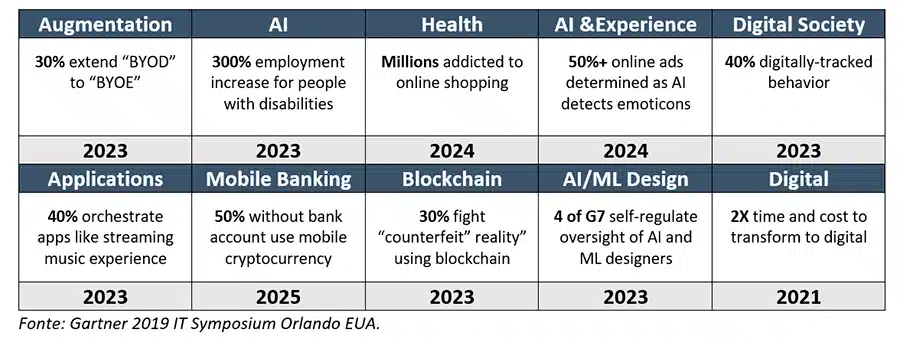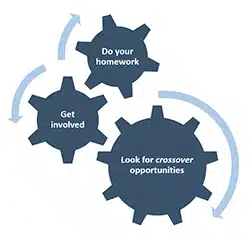Cyber Security & Future Forecasts
Is your company planning (or has it already planned) its cyber strategy to protect corporate and personal data? And is this planning based on the provisions of what is to come over the next decade?
By Daniella Vendramini

What is your company’s vision for 2020? Or maybe 2025?
Get ready for an explosion of visions for 2020. Nearly everything is on the table as we enter a new decade that will be defined by global innovation and technological advances. Check below the research published by Gartner this year, 2019, at the IT Symposium in Orlando, with some predictions already raised beyond 2020:
Top 10 Strategic Predictions for 2020 and Beyond

And this profusion of predictions offers a great opportunity to reorganize business plans, information security plans and even career plans.
What can we expect?
- Cyber Security on the Executive Committee’s agenda
As we enter this new decade, we can expect cyber security to be at the center of executive discussions. The main news of the past decade, from the journey of Eduardo Snowden’s revelations[1] to Facebook’s privacy violations of personal data, have taught CEOs that cyber security cannot be considered only at the end of business processes already in production. Business leaders will recognize that prior involvement of cyber security experts can help prevent major data violations that could make innovative plans unfeasible, disrupt operations, or, even worse, cause a total loss of trust in the brand.
[1] Eduardo Snowden is a systems analyst, former CIA systems manager, and former NSA contractor who made public details of several programs that make up the U.S. NSA’s global surveillance system. Source Wikipedia.Wikipédia.
- Privacy & Data Protection as a product/service
To create what might be called “Privacy & Data Protection” as a new product or service, the company will need to know what problems related to this sphere can be expected – and this is where the security and technology predictions of the turn of the decade come in, as shown in the figure above.
Notably, the market will see an increase in crossover predictions. People will see ads about security companies in partnership with other innovative companies. A practical example of this prediction is that if a clothing company requires the consumer to use a virtual fitting room, the customer will require a safe and private interaction. “So will your company be ready to offer this service?”
Other examples of crossover predictions include government, healthcare, automotive applications with critical infrastructure and increasing secure connectivity.
How can companies benefit from these predictions?
Companies will need to learn about security and technology predictions and act in a preventive and non-reactive way, famous “fire extinguishing”.

Good questions to ask from reports and prediction sessions include:
Get involved
- What is our company planning for 2020?
- Who is leading the data protection effort?
- How do projects compare to cyber threats?
Do your homework
- What are the experts saying about my industry?
- Which scenarios need to be examined more closely?
- Which projections are relevant to your role in the company?
- Which emerging technologies can we apply in our company?
Look for crossover opportunities
An example to be presented at this point is the future of autonomous vehicles that will involve Cyber Security experts at all stages of development and production processes. Rigorous testing, including global bugs, will become paramount in processes with next-generation autonomous vehicles.
Due to all the matters listed above, it is important to be aware of these predictions to take advantage of the benefits that new technologies and behaviors will bring, so that it is possible to even optimize the business management. In addition, of course, to also protect the company and the corporate and personal data in its custody.






